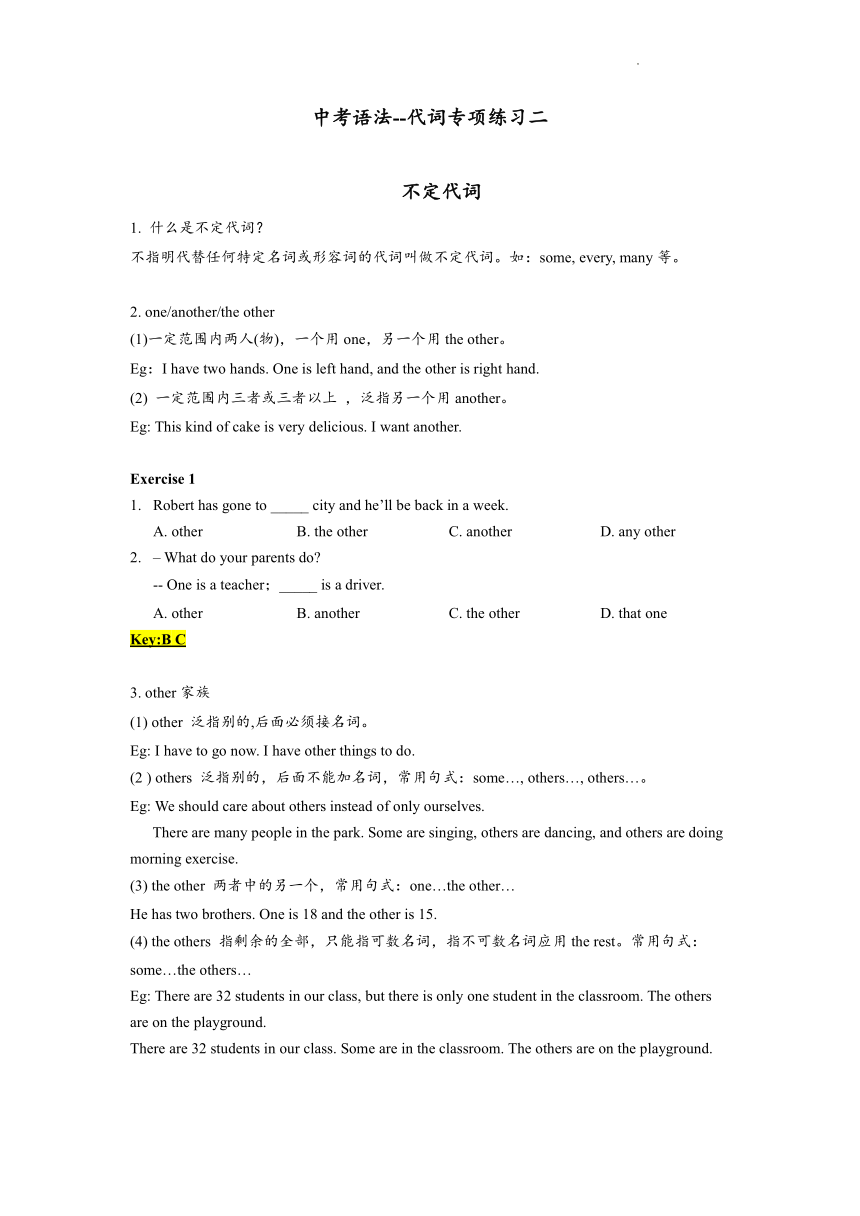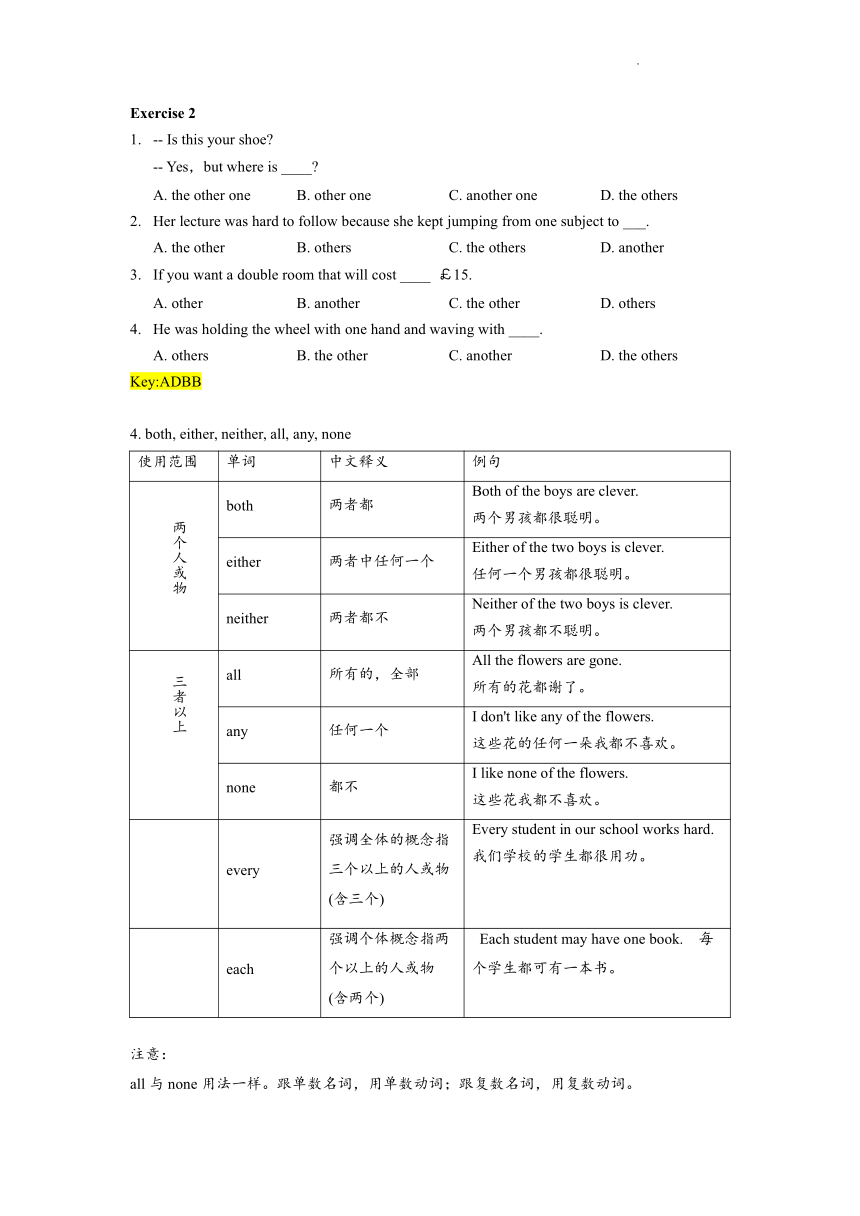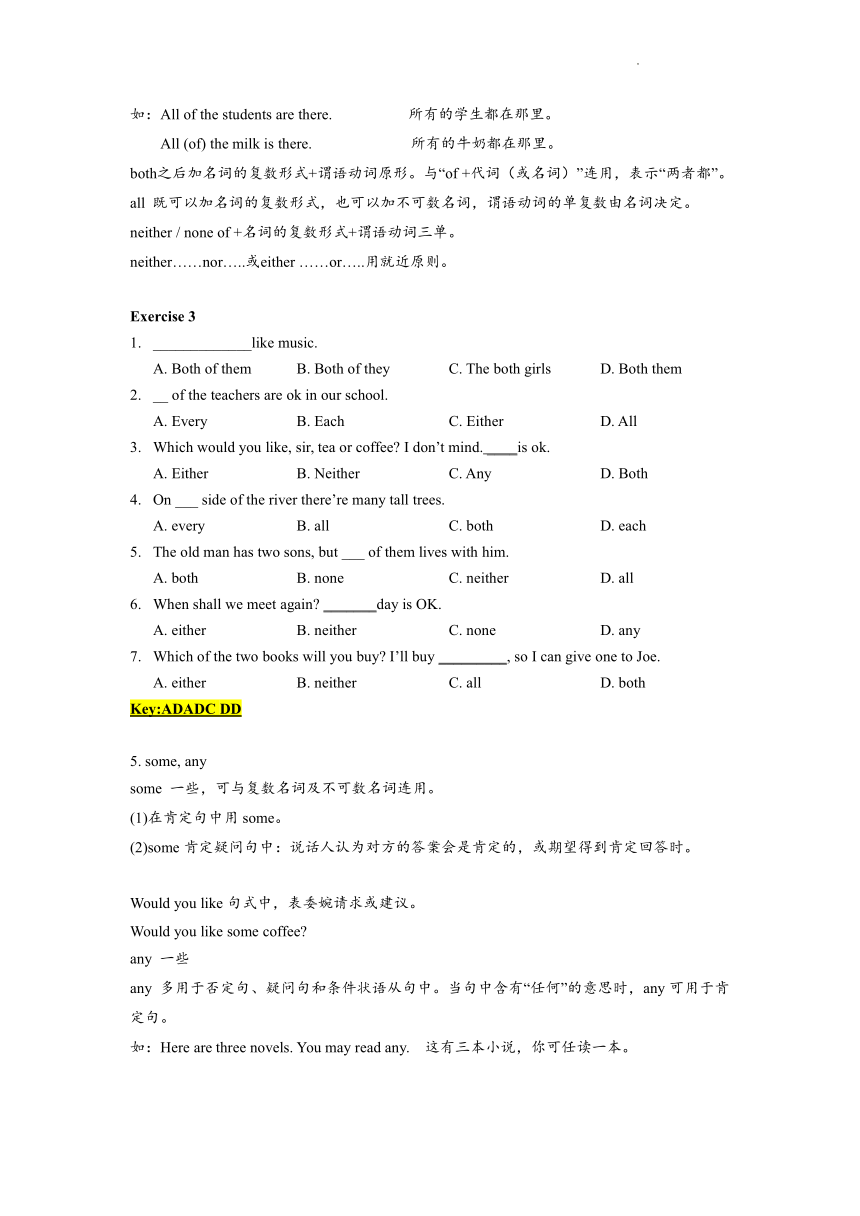2022年中考英语语法——代词专项讲解与练习(不定代词,含答案)
文档属性
| 名称 | 2022年中考英语语法——代词专项讲解与练习(不定代词,含答案) |  | |
| 格式 | docx | ||
| 文件大小 | 41.7KB | ||
| 资源类型 | 教案 | ||
| 版本资源 | 通用版 | ||
| 科目 | 英语 | ||
| 更新时间 | 2022-04-21 11:04:20 | ||
图片预览



文档简介
中考语法--代词专项练习二
不定代词
1. 什么是不定代词?
不指明代替任何特定名词或形容词的代词叫做不定代词。如:some, every, many等。
2. one/another/the other
(1)一定范围内两人(物),一个用one,另一个用the other。
Eg:I have two hands. One is left hand, and the other is right hand.
(2) 一定范围内三者或三者以上 ,泛指另一个用another。
Eg: This kind of cake is very delicious. I want another.
Exercise 1
1. Robert has gone to _____ city and he’ll be back in a week.
A. other B. the other C. another D. any other
2. – What do your parents do
-- One is a teacher;_____ is a driver.
A. other B. another C. the other D. that one
Key:B C
3. other家族
(1) other 泛指别的,后面必须接名词。
Eg: I have to go now. I have other things to do.
(2 ) others 泛指别的,后面不能加名词,常用句式:some…, others…, others…。
Eg: We should care about others instead of only ourselves.
There are many people in the park. Some are singing, others are dancing, and others are doing morning exercise.
(3) the other 两者中的另一个,常用句式:one…the other…
He has two brothers. One is 18 and the other is 15.
(4) the others 指剩余的全部,只能指可数名词,指不可数名词应用the rest。常用句式:some…the others…
Eg: There are 32 students in our class, but there is only one student in the classroom. The others are on the playground.
There are 32 students in our class. Some are in the classroom. The others are on the playground.
Exercise 2
1. -- Is this your shoe
-- Yes,but where is ____
A. the other one B. other one C. another one D. the others
2. Her lecture was hard to follow because she kept jumping from one subject to ___.
A. the other B. others C. the others D. another
3. If you want a double room that will cost ____ £15.
A. other B. another C. the other D. others
4. He was holding the wheel with one hand and waving with ____.
A. others B. the other C. another D. the others
Key:ADBB
4. both, either, neither, all, any, none
使用范围 单词 中文释义 例句
两个人或物 both 两者都 Both of the boys are clever. 两个男孩都很聪明。
either 两者中任何一个 Either of the two boys is clever. 任何一个男孩都很聪明。
neither 两者都不 Neither of the two boys is clever. 两个男孩都不聪明。
三者以上 all 所有的,全部 All the flowers are gone. 所有的花都谢了。
any 任何一个 I don't like any of the flowers. 这些花的任何一朵我都不喜欢。
none 都不 I like none of the flowers. 这些花我都不喜欢。
every 强调全体的概念指三个以上的人或物(含三个) Every student in our school works hard. 我们学校的学生都很用功。
each 强调个体概念指两个以上的人或物 (含两个) Each student may have one book. 每个学生都可有一本书。
注意:
all与none用法一样。跟单数名词,用单数动词;跟复数名词,用复数动词。
如:All of the students are there. 所有的学生都在那里。
All (of) the milk is there. 所有的牛奶都在那里。
both之后加名词的复数形式+谓语动词原形。与“of +代词(或名词)”连用,表示“两者都”。
all 既可以加名词的复数形式,也可以加不可数名词,谓语动词的单复数由名词决定。
neither / none of +名词的复数形式+谓语动词三单。
neither……nor…..或either ……or…..用就近原则。
Exercise 3
1. _____________like music.
A. Both of them B. Both of they C. The both girls D. Both them
2. __ of the teachers are ok in our school.
A. Every B. Each C. Either D. All
3. Which would you like, sir, tea or coffee I don’t mind. ____is ok.
A. Either B. Neither C. Any D. Both
4. On ___ side of the river there’re many tall trees.
A. every B. all C. both D. each
5. The old man has two sons, but ___ of them lives with him.
A. both B. none C. neither D. all
6. When shall we meet again _______day is OK.
A. either B. neither C. none D. any
7. Which of the two books will you buy I’ll buy _________, so I can give one to Joe.
A. either B. neither C. all D. both
Key:ADADC DD
5. some, any
some 一些,可与复数名词及不可数名词连用。
(1)在肯定句中用some。
(2)some肯定疑问句中:说话人认为对方的答案会是肯定的,或期望得到肯定回答时。
Would you like句式中,表委婉请求或建议。
Would you like some coffee
any 一些
any 多用于否定句、疑问句和条件状语从句中。当句中含有“任何”的意思时,any可用于肯定句。
如:Here are three novels. You may read any. 这有三本小说,你可任读一本。
Exercise 4
1. ---Would you like ___ coffee
---Yes, I’d like _______.
A. any, any B. some, some C. some, any D. any, some
2. There isn’t ___ paper here. Will you go and get ____for me
A. any, any B. any, some C. much, many D. many, much
3. There isn’t ______ water in the cup.
A. any B. many C. some D. the
Key:BBA
6. few, little, a few, a little
可数名词 不可数名词 含义
few little 否定含义,没有多少了
a few a little 肯定含义,还有一点
例如:
He has a few friends. 他有几个朋友。
He has few friends. 他几乎没有朋友。
We still have a little time. 我们还有点时间。
There is little time left. 几乎没剩下什么时间了。
Exercise 5
1. He is not a kind- hearted man, ____ people can get on well with him.
A. few B. a few C. little D. a little
2. Though they had cleaned the door, there was still _____ water on it.
A. little B. a little C. few D. a few
3. We have _____ sugar. Really Let’s go and buy some.
A. few B. a few C. little D. a little
4. There is ____ meat at home. Would you please go and buy______
A. some, a little B. a little, any C. little, some D. little, any
5. What do you usually have for breakfast ___ milk and ______ eggs.
A. Little, a little B. A few, few C. A little, a few D. A few, a little
6. I bought ___ exercise books with _____ money.
A. a few, a few B. a few, a little C. a little, a few D. a little, a little
7. Would you like some tea Yes, just _____.
A. a few B. few C. a little D. little
Key:ABCCC BC
7. Many,much
单词“许多” 区别 例句
many +可数名词 How many people are there at the meeting
much +不可数名词 How much time has we left
many,much前可有so, too, how等词进行修饰。
如:There are too many mistakes in your diary.
So many people are waiting for the bus.
Sorry, I’m afraid I can’t go with you. I’ve got too much work to do.
短语 区别 例句
too much “太多”,后加不可数名词 There is too much noise here.
much too “太”,相当于too,后加形容词 He is much too fat.
Exercise 6
1. He can’t hear you, because there is _______noise here.
A. very much B. too much C. much too D. so many
2. The farmer is busy because he’s so ______sheep to keep and so ______work to do.
A. much, many B. many, much C. many, a lot D. a lot, much
Key:BB
8. 复合不定代词
(1)复合不定代词由some, any, no, every加上-body, -thing, -one构成。
如:somebody某人 anybody任何人 nobody没人 everybody每人
someone某人 anyone任何人 no one没人 everyone每人
something某物 anything任何事物 nothing没东西 everything每件事
(2)复合不定代词的特殊用法
①用在表示“请求”、“建议”或希望得到对方肯定答复的疑问句中。
如:Would you like something to drink 你想喝点什么吗?
②复合不定代词被定语所修饰时,定语必须放在它的后面。
如:There is something wrong with the radio. 收音机出了毛病。
(4)对比不定代词anyone/any one;no one/none;every/each的用法
① anyone和any one
anyone仅指人,any one既可指人,也可指物。
② no one和none
a) none 后跟of短语,既可指人又可指物,而no one只能单独使用,只指人。
b) none 做主语,谓语动词用单、复数均可,而no one做主语谓语动词只能是单数。
如:None of you could lift it. 你们中没有人可举起它。
---- Did any one call me up just now --刚才有人打电话给我吗
---- No one. --没有。
c) none与数量有关,可回答how many,表示“一个也没有”;而no one表示“什么人也没有”,可用于回答who。如:
--How many people are there in the room
--None.
--Who was late today
--No one.
(3)anyone, anything, any one, anybody用在肯定句中,起强调作用,表示“无论什么事物(人)”、“任何事物(人)”。
如:Anybody will tell you the way. 无论谁都会告诉你路线。
Exercise 7
1. He has ______ to tell us.
A. something important B. important something
C. anything useful D. useful nothing
2. —Do you have ____ at home now, Stella
—No, we still have to get several pounds of fruit and some tea.
A. something B. everything C. nothing D. anything
3. —Do you mind if Charlie borrows a few hundred dollars from you
—I’m afraid I do. I’ll be glad to lend money to ____ but Charlie.
A. someone B. everyone C. anyone D. no one
Key:ABC
不定代词
1. 什么是不定代词?
不指明代替任何特定名词或形容词的代词叫做不定代词。如:some, every, many等。
2. one/another/the other
(1)一定范围内两人(物),一个用one,另一个用the other。
Eg:I have two hands. One is left hand, and the other is right hand.
(2) 一定范围内三者或三者以上 ,泛指另一个用another。
Eg: This kind of cake is very delicious. I want another.
Exercise 1
1. Robert has gone to _____ city and he’ll be back in a week.
A. other B. the other C. another D. any other
2. – What do your parents do
-- One is a teacher;_____ is a driver.
A. other B. another C. the other D. that one
Key:B C
3. other家族
(1) other 泛指别的,后面必须接名词。
Eg: I have to go now. I have other things to do.
(2 ) others 泛指别的,后面不能加名词,常用句式:some…, others…, others…。
Eg: We should care about others instead of only ourselves.
There are many people in the park. Some are singing, others are dancing, and others are doing morning exercise.
(3) the other 两者中的另一个,常用句式:one…the other…
He has two brothers. One is 18 and the other is 15.
(4) the others 指剩余的全部,只能指可数名词,指不可数名词应用the rest。常用句式:some…the others…
Eg: There are 32 students in our class, but there is only one student in the classroom. The others are on the playground.
There are 32 students in our class. Some are in the classroom. The others are on the playground.
Exercise 2
1. -- Is this your shoe
-- Yes,but where is ____
A. the other one B. other one C. another one D. the others
2. Her lecture was hard to follow because she kept jumping from one subject to ___.
A. the other B. others C. the others D. another
3. If you want a double room that will cost ____ £15.
A. other B. another C. the other D. others
4. He was holding the wheel with one hand and waving with ____.
A. others B. the other C. another D. the others
Key:ADBB
4. both, either, neither, all, any, none
使用范围 单词 中文释义 例句
两个人或物 both 两者都 Both of the boys are clever. 两个男孩都很聪明。
either 两者中任何一个 Either of the two boys is clever. 任何一个男孩都很聪明。
neither 两者都不 Neither of the two boys is clever. 两个男孩都不聪明。
三者以上 all 所有的,全部 All the flowers are gone. 所有的花都谢了。
any 任何一个 I don't like any of the flowers. 这些花的任何一朵我都不喜欢。
none 都不 I like none of the flowers. 这些花我都不喜欢。
every 强调全体的概念指三个以上的人或物(含三个) Every student in our school works hard. 我们学校的学生都很用功。
each 强调个体概念指两个以上的人或物 (含两个) Each student may have one book. 每个学生都可有一本书。
注意:
all与none用法一样。跟单数名词,用单数动词;跟复数名词,用复数动词。
如:All of the students are there. 所有的学生都在那里。
All (of) the milk is there. 所有的牛奶都在那里。
both之后加名词的复数形式+谓语动词原形。与“of +代词(或名词)”连用,表示“两者都”。
all 既可以加名词的复数形式,也可以加不可数名词,谓语动词的单复数由名词决定。
neither / none of +名词的复数形式+谓语动词三单。
neither……nor…..或either ……or…..用就近原则。
Exercise 3
1. _____________like music.
A. Both of them B. Both of they C. The both girls D. Both them
2. __ of the teachers are ok in our school.
A. Every B. Each C. Either D. All
3. Which would you like, sir, tea or coffee I don’t mind. ____is ok.
A. Either B. Neither C. Any D. Both
4. On ___ side of the river there’re many tall trees.
A. every B. all C. both D. each
5. The old man has two sons, but ___ of them lives with him.
A. both B. none C. neither D. all
6. When shall we meet again _______day is OK.
A. either B. neither C. none D. any
7. Which of the two books will you buy I’ll buy _________, so I can give one to Joe.
A. either B. neither C. all D. both
Key:ADADC DD
5. some, any
some 一些,可与复数名词及不可数名词连用。
(1)在肯定句中用some。
(2)some肯定疑问句中:说话人认为对方的答案会是肯定的,或期望得到肯定回答时。
Would you like句式中,表委婉请求或建议。
Would you like some coffee
any 一些
any 多用于否定句、疑问句和条件状语从句中。当句中含有“任何”的意思时,any可用于肯定句。
如:Here are three novels. You may read any. 这有三本小说,你可任读一本。
Exercise 4
1. ---Would you like ___ coffee
---Yes, I’d like _______.
A. any, any B. some, some C. some, any D. any, some
2. There isn’t ___ paper here. Will you go and get ____for me
A. any, any B. any, some C. much, many D. many, much
3. There isn’t ______ water in the cup.
A. any B. many C. some D. the
Key:BBA
6. few, little, a few, a little
可数名词 不可数名词 含义
few little 否定含义,没有多少了
a few a little 肯定含义,还有一点
例如:
He has a few friends. 他有几个朋友。
He has few friends. 他几乎没有朋友。
We still have a little time. 我们还有点时间。
There is little time left. 几乎没剩下什么时间了。
Exercise 5
1. He is not a kind- hearted man, ____ people can get on well with him.
A. few B. a few C. little D. a little
2. Though they had cleaned the door, there was still _____ water on it.
A. little B. a little C. few D. a few
3. We have _____ sugar. Really Let’s go and buy some.
A. few B. a few C. little D. a little
4. There is ____ meat at home. Would you please go and buy______
A. some, a little B. a little, any C. little, some D. little, any
5. What do you usually have for breakfast ___ milk and ______ eggs.
A. Little, a little B. A few, few C. A little, a few D. A few, a little
6. I bought ___ exercise books with _____ money.
A. a few, a few B. a few, a little C. a little, a few D. a little, a little
7. Would you like some tea Yes, just _____.
A. a few B. few C. a little D. little
Key:ABCCC BC
7. Many,much
单词“许多” 区别 例句
many +可数名词 How many people are there at the meeting
much +不可数名词 How much time has we left
many,much前可有so, too, how等词进行修饰。
如:There are too many mistakes in your diary.
So many people are waiting for the bus.
Sorry, I’m afraid I can’t go with you. I’ve got too much work to do.
短语 区别 例句
too much “太多”,后加不可数名词 There is too much noise here.
much too “太”,相当于too,后加形容词 He is much too fat.
Exercise 6
1. He can’t hear you, because there is _______noise here.
A. very much B. too much C. much too D. so many
2. The farmer is busy because he’s so ______sheep to keep and so ______work to do.
A. much, many B. many, much C. many, a lot D. a lot, much
Key:BB
8. 复合不定代词
(1)复合不定代词由some, any, no, every加上-body, -thing, -one构成。
如:somebody某人 anybody任何人 nobody没人 everybody每人
someone某人 anyone任何人 no one没人 everyone每人
something某物 anything任何事物 nothing没东西 everything每件事
(2)复合不定代词的特殊用法
①用在表示“请求”、“建议”或希望得到对方肯定答复的疑问句中。
如:Would you like something to drink 你想喝点什么吗?
②复合不定代词被定语所修饰时,定语必须放在它的后面。
如:There is something wrong with the radio. 收音机出了毛病。
(4)对比不定代词anyone/any one;no one/none;every/each的用法
① anyone和any one
anyone仅指人,any one既可指人,也可指物。
② no one和none
a) none 后跟of短语,既可指人又可指物,而no one只能单独使用,只指人。
b) none 做主语,谓语动词用单、复数均可,而no one做主语谓语动词只能是单数。
如:None of you could lift it. 你们中没有人可举起它。
---- Did any one call me up just now --刚才有人打电话给我吗
---- No one. --没有。
c) none与数量有关,可回答how many,表示“一个也没有”;而no one表示“什么人也没有”,可用于回答who。如:
--How many people are there in the room
--None.
--Who was late today
--No one.
(3)anyone, anything, any one, anybody用在肯定句中,起强调作用,表示“无论什么事物(人)”、“任何事物(人)”。
如:Anybody will tell you the way. 无论谁都会告诉你路线。
Exercise 7
1. He has ______ to tell us.
A. something important B. important something
C. anything useful D. useful nothing
2. —Do you have ____ at home now, Stella
—No, we still have to get several pounds of fruit and some tea.
A. something B. everything C. nothing D. anything
3. —Do you mind if Charlie borrows a few hundred dollars from you
—I’m afraid I do. I’ll be glad to lend money to ____ but Charlie.
A. someone B. everyone C. anyone D. no one
Key:ABC
同课章节目录
- 词法
- 名词
- 动词和动词短语
- 动词语态
- 动词时态
- 助动词和情态动词
- 非谓语动词
- 冠词
- 代词
- 数词和量词
- 形容词副词及其比较等级
- 介词和介词短语
- 连词和感叹词
- 构词法
- 相似、相近词比较
- 句法
- 陈述句
- 一般疑问句和否定疑问句
- 特殊疑问句及选择疑问句
- 反意疑问句
- 存在句(There be句型)
- 宾语从句
- 定语从句
- 状语从句
- 主谓一致问题
- 简单句
- 并列句
- 复合句
- 主谓一致
- 主、表语从句
- 名词性从句
- 直接引语和间接引语
- 虚拟语气
- 感叹句
- 强调句
- 倒装句
- 祈使句
- 句子的成分
- 句子的分类
- 题型专区
- 单项选择部分
- 易错题
- 完形填空
- 阅读理解
- 词汇练习
- 听说训练
- 句型转换
- 补全对话
- 短文改错
- 翻译
- 书面表达
- 任务型阅读
- 语法填空
- 其他资料
